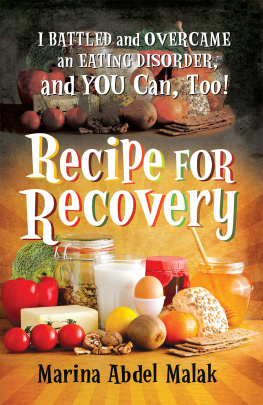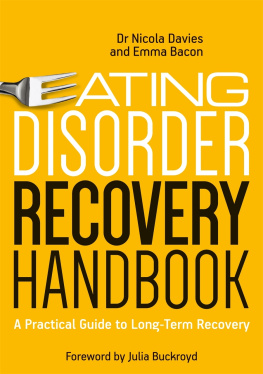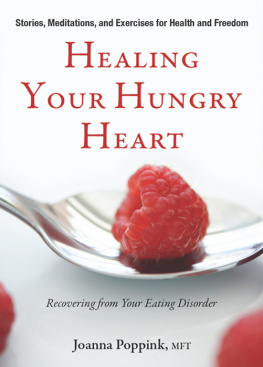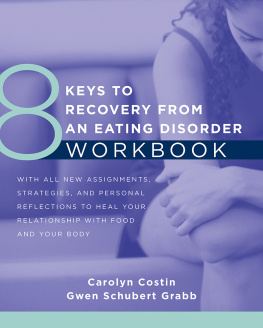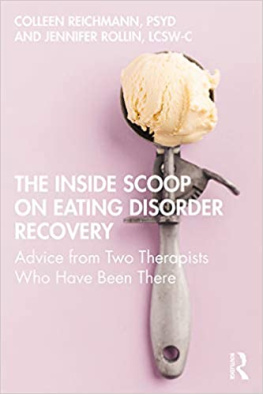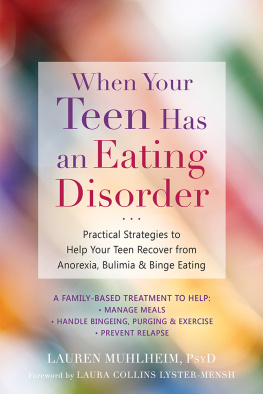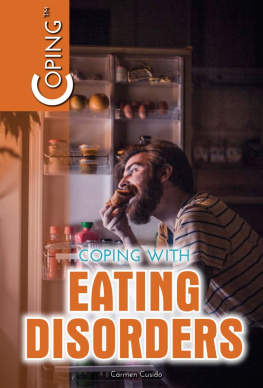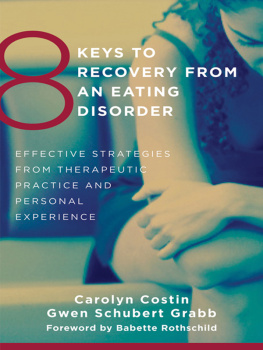

GENERAL STORE PUBLISHING HOUSE INC.
499 OBrien Road, Renfrew, Ontario, Canada K7V 3Z3
Telephone 1.613.599.2064 or 1.800.465.6072
http://www.gsph.com
ISBN 978-1-77123-058-2
Copyright Marina Abdel Malak 2014
Cover art, design: Magdalene Carson
Published in Canada
No part of this book may be reproduced, stored in a retrieval system, or transmitted in any form or by any means without the prior written permission of the publisher or, in case of photocopying or other reprographic copying, a licence from Access Copyright (Canadian Copyright Licensing Agency), One Yonge Street, Suite 800, Toronto, Ontario, M5E 1E5.
Library and Archives Canada Cataloguing in Publication
Malak, Marina Abdel, 1993-, author
Recipe for recovery : I battled and overcame and eating disorder and you can, too! / Marina Abdel Malak.
Issued in print and electronic formats.
ISBN 978-1-77123-058-2 (pbk.).--ISBN 978-1-77123-166-4 (epub).-
ISBN 978-1-77123-167-1 (mobi).--ISBN 978-1-77123-168-8 (web)
1. Malak, Marina Abdel, 1993-. 2. Anorexia nervosa--Patients--Biography.
3. Eating disorders. I. Title.
RC552.A5M35 2014 362.19685262 C2013-908183-6 C2013-908184-4
To Mom, Dad, and Nansy. Thank you for being my strength when I was weak and for being my hope when I was distressed. Thank you for your unconditional love and for always believing in me. Thank you for nurturing me back to life, one spoonful at a time.
And not only that, but we also glory in tribulations, knowing that tribulation produces perseverance; and perseverance, character; and character, hope.
(Romans 5:34)
Contents
Preface
Weight. Food. Numbers. Diet. Calories. Clothes. These words are bound to be meaningful to most of us today. We live in a society that often demands that we be thin in order to achieve the ever-so-desired ideal body. Many people might hear these messages and simply ignore them. But for some, the desire to be thin might interact with genetic predis-positions and other factors to fuel up an eating disorder (ED).
This is where my story comes in. If you saw me now, you might never have imagined that I once struggled with anorexia nervosa (AN) and that I nearly died because of it. But looks can be deceiving. Indeed, the eating disorder that took hold of me caused havoc and harm in all aspects of my life. Swept up in the desire to be thin, the illness controlled my mind. Eating was no longer pleasurable but a sin. The scale became my best friend at times and enemy at others, depending on what the number said. Years of starvation took its toll on my health, rendering my body deathly skinny. Reading this, you may be dismayed and feel that this book will be a memoir of my everyday battles with food. But this is not the case. This is not meant to be a depressing tale of my experiences. Rather, I am going to give you an inner look at what exactly goes through the mind of a starving anorexic, and to help you understand why recovery is such a difficult journey.
This book is not only for those who struggle with eating disorders, although it may be helpful for some. It is also for caregivers, professionals, friends, families, and anyone else interested in learning about this illness anyone who simply wishes to learn more about the mental illness that causes victims to lose all sense of control over eating and become irrational about weight and food. The information herein is not meant to replace medical advice or treatment; rather, it is meant to give you an inside look about what eating disorders are, what causes them, how they manifest in patients, and how they can be treated.
Why should you read this book? Because eating disorders are real, and Ill bet that someone you know or see might just have an eating disorder. You should read this book because you ought to know that eating disorders cause the most deaths among all psychiatric illnesses.
The first chapter begins with a description of my experience with anorexia nervosa thus far: how it developed and what this illness did to my life. Following this are chapters that explain some signs of eating disorders, as well as the dangers of ED. Once you get through some facts (which are important to know, as they help you understand exactly why eating disorders are complicated and serious at the same time), I will start to talk about my journey through recovery. These chapters are brief and include my personal experiences throughout recovery, all filled with tips and tools to help you or someone else with ED along the way to recovery. When I refer to the patient, I use feminine pronouns to eliminate confusion but this does not mean that males do not get ED as well. As you will learn, anyone can become ill with an eating disorder, and the information in this book applies to all patients, not just females.
You will notice that I refer to ED as he. A patient may call her ED a name, but I simply referred to it as ED. In any case, it is easier to think of ED as being a separate thing from the patient it is not the patient who is trying to be difficult or ill, but the illness that is forcing her to do so. You may notice that when helping a patient recover, it is easier to say, ED is making you starve yourself, as this helps the patient understand that the illness is not her fault, nor is she trying to keep herself sick. Caregivers may also find it helpful to refer to ED instead of the patient when becoming angry. For example, you may be angry at the illness, but you are not furious with the patient.
As you read this book, keep in mind the following: EDs are serious mental illnesses, yet they are often under-recognized. They are serious and can be fatal. Everyone with an eating disorder deserves to get help, treatment, and support. And finally, eating disorders can be treated. Recovery is truly possible for every patient. It takes time and effort, but it will come with the correct amount and type of treatment.
The facts in this book are supported with credible evidence, and references can be found throughout the text. I also want to mention that any characters in this book are real, but I have used fictional names.
Lastly, this book is based on my own experiences with anorexia nervosa. Others may have different experiences and opinions. This is not a heavy read; it is meant to be entertaining, interesting, and even humorous at times. I have included my own journal entries and thoughts throughout the chapters to give you an inside look from the patients perspective, or to supplement any information presented. Dont forget to take a moment to make sense of the food puns!
Now, sit back and enjoy some popcorn as you read, because you will be a-maiz-ed at what exactly makes up the Recipe for Recovery.
Chapter One

I wont eat... but I donut think I have a problem
January 2000: I am seven years old, playing tag with my sister. I suddenly stop running because I am out of breath. I take a deep, long breath and feel scared. Why is it so hard to breathe? For some reason, it is as though my brain is telling me to look down. I look and I see my little round tummy. Is this why I cannot run or play for a long time without getting tired? I remember something I heard in a commercial once that extra fat makes us unhealthy. Am I fat? I ponder about this, but I am confused. I shrug. I return to playing with my sister. But as I am running around, I cant help but think of my tummy and how it moves when I do.

